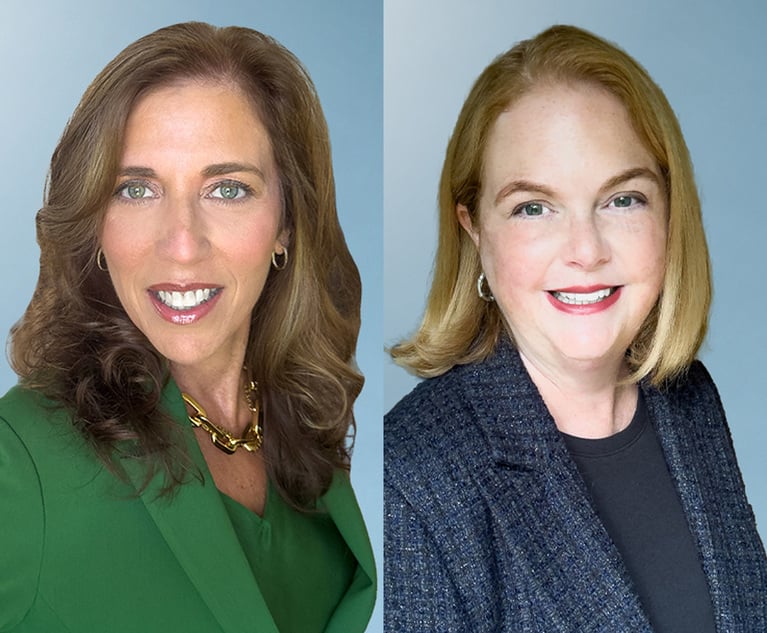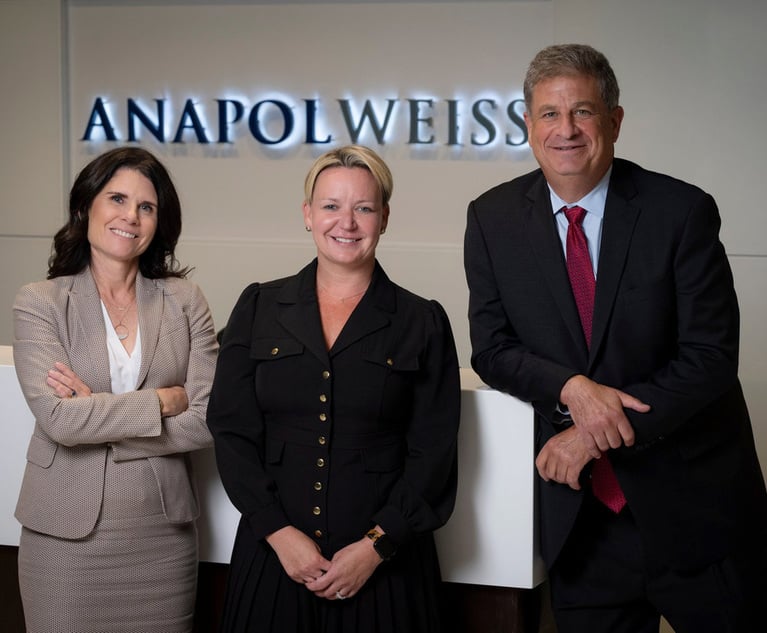'Half-Assed Innovation': Do Law Firms Need to Change Incentives to Innovate?
Former Littler Analytics leader Zev Eigen likens common law firm innovation structure to "a horse-and-buggy company" trying to design cars.
March 26, 2018 at 01:09 PM
7 minute read
The original version of this story was published on Legal Tech News
 Zev Eigen.
Zev Eigen.
The legal industry has sent some mixed messages when it comes to capacity for innovation. Often, one's interpretation is dependent on whom you ask.
Former Littler Mendelson global director of data analytics Zev Eigen is known for his sobering assessment of law firm technology capabilities. Having joined Littler with a background equal parts analytics and law, Eigen has seen big data leveraged from the perspective of the enterprise as well as law firm. And in his view, the legal industry has much to learn when it comes to actually innovating.
Legaltech News, an affiliate of The Recorder, caught up with Eigen, who has left Littler to help found analytics company Syndio, to get his assessment on the state of law firm data analytics. This interview has been condensed for length.
Legaltech News: How would you describe the legal industry's utilization of data science as a practice?
ZE: Law firms are starting to try to do stuff, but firms were not set up to do anything that's innovative. It's like a horse-and-buggy company: How can a horse-and-buggy company design cars when their whole business model and all its individuals are incentivized by how many horses they can make run faster? All the decision makers were incentivized by how many hours they spent on horseback.
Your whole business model is based on that metric, and I come along and say, “There's these things called cars, and your clients love cars so much more than horses.” Why would you do that?
Is this due to the partnership structure?
It's entirely because of the incentivization structure at law firms. It was built on a model that made perfect sense in the '60s, '70s and even the '80s and '90s. It's completely orthogonal to innovation.
When we see firms quote, unquote “innovate,” it's horizontal innovation. It's like, 'Oh we have a better buoy system. We have a more efficient system for sourcing work. We have a better way of document review.' They're making the horses run faster and enable people to stay in this battle longer.
Upon leaving Littler, were you frustrated because of these concerns?
No. Law firms are really trying, and I think they are really genuinely trying to catch up. They realize that the market is shifting, but there's a disconnect between that realization and what they can do because of their structure and their incentive. Humans can't overcome that unless you have people that completely change incentives and structures. And there's a disconnect between those considerations and those questions and whether firms can innovate. Many firms are not linking those two things.
I've given many presentations to C-suite leaders and law firms all over the world, and when I bring this up they're like, “Oh yeah, that makes a lot of sense.” And I'm like, “OK, here's the fix. Before you start rolling out some half-assed innovation, how about changing the way your firm is structured to incentivize innovation?” And they're like, “No, no good.”
With utilization of data science as a practice, where does law stand in relation to other professions?
Law is very far behind. You see this trickle-down effect going from marketing and sales to finance and strategy and other areas of the organizational function. Law is the slowest of the parties. They're very slow. The ability to hire the right people at law firms is hamstrung by that advantage going to other industries. When I talk to people that want to work at a law firm and are good data scientists, they'll ask me who is there, and I'm like well, it's just me. Go team. And it's hard because their options are so varied, and the incentives aren't there.
You're a second-class citizen at a law firm if you don't have a J.D. I've had instances where lawyers will give a hard time to someone who's on the data science team, who's probably way more valuable than any given lawyer or partner but because law firms are structured in a way that lawyers are at the top, they're the profit center, and everyone else is staff and a cost.
If you come in and you have a Ph.D in data science and you're a gifted data scientist, at a law firm, they're like, ”We don't need you, why do we have you around? Oh, you're just that guy who does data.” Sometimes they get confused for a paralegal. Not to denigrate paralegals, but I've had analysts say to me they're basically the equivalent of paralegals. And that's totally crazy.
Are law firms likely to wake up to this problem?
I hope so. We're in this sort of middle ground now where some firms are starting to do more legitimate things. I think at the very beginning, it was a lot of smoke and mirrors, almost everything I was seeing was nonsense. Someone will say, “We have someone doing XYZ; we have capabilities we don't have.” And now firms are starting to do what they need to do.
I'm seeing less and less of firms that can get away with just having a person be there and stand up and say, “I'm a data scientist! These are good.” And you look at that person's resume and they're a lawyer. I love lawyers but like, just saying you're a data scientist when your background is law and you took a statistics class, I don't know if that works …
The hiring is the problem. When firms ask me who should we hire, I always say this: Do not look for someone with law firm experience, do not look for someone from like the law world. If you do, you're not getting the right skill sets.
What you want is someone with hardcore data science that you could teach like five things to get the law right. Don't hire someone who's a practitioner or someone from another area of law like document review. If you look at resumes, people hire people with law firm experience, knowledge about law firms. I think that's a very big mistake.
What's it going to take to make law firms move in the direction of other industries in terms of technology?
I think it is slowly happening. There are two things are going to happen. One is the cohort change. The people who are managing law firms now—God bless them, but they tend to be a little bit older, tend to come from a generation where law was a profession first, not a business, and their model for how law firms make money is not consistent with the future version of what law firms are going to be. And frankly a lot of them are just biding their time. A lot of them are just going to keep the lights on, do things this way; they have no interest in completely overhauling incentives.
Over time, we're going to see people who are in their 30s and 40s start taking management roles in law firms, more and more running the firms. When you start seeing that take place, they're going to change the practice model to business-first not profession-first. And they're going to think about structuring and making changes that will create more room for innovation.
The second thing I see happening now is smaller and medium-sized firms structuring how they provide services, and very differently than the larger firms. They're less worried about the billable hour or whatever nonsense others are worried about because they won't have to. There's a lot of startups, a lot of stuff you can leverage, and the smaller and midsized firms are better positioned because of their nimbleness, I guess, to make changes.
This content has been archived. It is available through our partners, LexisNexis® and Bloomberg Law.
To view this content, please continue to their sites.
Not a Lexis Subscriber?
Subscribe Now
Not a Bloomberg Law Subscriber?
Subscribe Now
NOT FOR REPRINT
© 2025 ALM Global, LLC, All Rights Reserved. Request academic re-use from www.copyright.com. All other uses, submit a request to [email protected]. For more information visit Asset & Logo Licensing.
You Might Like
View All

Faegre Drinker Adds Three Former Federal Prosecutors From Greenberg Traurig
4 minute read
Anapol Weiss Acquires Boutique Led by Star Litigator Alexandra Walsh
5 minute read
Pierson Ferdinand Lures Veteran M&A Specialist From Sheppard Mullin in Silicon Valley
4 minute readTrending Stories
Who Got The Work
Michael G. Bongiorno, Andrew Scott Dulberg and Elizabeth E. Driscoll from Wilmer Cutler Pickering Hale and Dorr have stepped in to represent Symbotic Inc., an A.I.-enabled technology platform that focuses on increasing supply chain efficiency, and other defendants in a pending shareholder derivative lawsuit. The case, filed Oct. 2 in Massachusetts District Court by the Brown Law Firm on behalf of Stephen Austen, accuses certain officers and directors of misleading investors in regard to Symbotic's potential for margin growth by failing to disclose that the company was not equipped to timely deploy its systems or manage expenses through project delays. The case, assigned to U.S. District Judge Nathaniel M. Gorton, is 1:24-cv-12522, Austen v. Cohen et al.
Who Got The Work
Edmund Polubinski and Marie Killmond of Davis Polk & Wardwell have entered appearances for data platform software development company MongoDB and other defendants in a pending shareholder derivative lawsuit. The action, filed Oct. 7 in New York Southern District Court by the Brown Law Firm, accuses the company's directors and/or officers of falsely expressing confidence in the company’s restructuring of its sales incentive plan and downplaying the severity of decreases in its upfront commitments. The case is 1:24-cv-07594, Roy v. Ittycheria et al.
Who Got The Work
Amy O. Bruchs and Kurt F. Ellison of Michael Best & Friedrich have entered appearances for Epic Systems Corp. in a pending employment discrimination lawsuit. The suit was filed Sept. 7 in Wisconsin Western District Court by Levine Eisberner LLC and Siri & Glimstad on behalf of a project manager who claims that he was wrongfully terminated after applying for a religious exemption to the defendant's COVID-19 vaccine mandate. The case, assigned to U.S. Magistrate Judge Anita Marie Boor, is 3:24-cv-00630, Secker, Nathan v. Epic Systems Corporation.
Who Got The Work
David X. Sullivan, Thomas J. Finn and Gregory A. Hall from McCarter & English have entered appearances for Sunrun Installation Services in a pending civil rights lawsuit. The complaint was filed Sept. 4 in Connecticut District Court by attorney Robert M. Berke on behalf of former employee George Edward Steins, who was arrested and charged with employing an unregistered home improvement salesperson. The complaint alleges that had Sunrun informed the Connecticut Department of Consumer Protection that the plaintiff's employment had ended in 2017 and that he no longer held Sunrun's home improvement contractor license, he would not have been hit with charges, which were dismissed in May 2024. The case, assigned to U.S. District Judge Jeffrey A. Meyer, is 3:24-cv-01423, Steins v. Sunrun, Inc. et al.
Who Got The Work
Greenberg Traurig shareholder Joshua L. Raskin has entered an appearance for boohoo.com UK Ltd. in a pending patent infringement lawsuit. The suit, filed Sept. 3 in Texas Eastern District Court by Rozier Hardt McDonough on behalf of Alto Dynamics, asserts five patents related to an online shopping platform. The case, assigned to U.S. District Judge Rodney Gilstrap, is 2:24-cv-00719, Alto Dynamics, LLC v. boohoo.com UK Limited.
Featured Firms
Law Offices of Gary Martin Hays & Associates, P.C.
(470) 294-1674
Law Offices of Mark E. Salomone
(857) 444-6468
Smith & Hassler
(713) 739-1250






